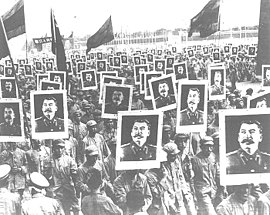The term "cult of personality" refers to the intense devotion of Soviet citizens to Stalin. By appealing to the hearts of people through constant propaganda, people began to "fall in love" with Stalin's personality, rather than his actions. Nowadays, Stalin is sometimes regarded as "evil" and "heartless" due to his many crimes against humanity, but he was revered and praised during his reign.
In present times, it is hard to imagine that one man could accrue so much power. One major way that Stalin did become so successful was by appealing to people's religious affiliation through propaganda. Since 988 CE, the Russian Orthodox Church had been a strong presence in the lives of the Russian people. Though the religiousness of the country fluctuated throughout history, by the time Stalin gained power, the Russian Orthodox Church was still enjoying its status as the official church of the Soviet Union. Because so many Soviets were religious, Stalin was able to easily manipulate this for his own benefit.
At the height of his power, Stalin was called "father" by the citizens of the Soviet Union. The people were considered to be his "children". Generally, the title of "father" was reserved for Russian Orthodox priests, as well as God himself. This nickname shows that in the eyes of the people, Stalin was Godlike. Instead of worshipping at the church, people worshipped Stalin, which led to decreased religiousness during Stalin's rule.
Stalin's propagandists also embraced the religious practice of idolatry. This was seen most clearly through effigies, which are sculptures or models of people. Stalin's image was plastered everywhere, even being the subject of many parades throughout the country.
Stalin was elevated to such a high status within the Soviet Union that he became a near superhero. Because of this, it seemed as if he could do no wrong in the eyes of the people, regardless of the fact that he killed millions of his own citizens. Ultimately, Stalin's cult of personality was denounced by his successor, Nikita Khrushchev, who said it was against Marxist thought. Nonetheless, Stalin's cult of personality became an example for other communist leaders, such as Mao Tse-Tung, due to the immense power it gave him.

Sources:
https://en.wikipedia.org/wiki/Stalin%27s_cult_of_personality
http://www.iisg.nl/exhibitions/chairman/sovintro.php
https://theyorkhistorian.com/2015/09/18/stalins-cult-of-personality-its-origins-and-progression/
http://soviethistory.msu.edu/1939-2/cult-of-personality/
http://historycollection.co/joseph-stalin-cult-personality/
https://en.wikipedia.org/wiki/Religion_in_the_Soviet_Union
Teagan-- I thought that your post gave a great description as to why Stalin was so revered during his time despite how we view him as an "evil" dictator today. One's reputation is extremely important, especially when used to assert an individual's power and in the case of Stalin, he utilized this "Cult of Personality" and made himself appealing and fatherly to the citizens of the Soviet Union. I thought it was interesting that you explained Stalin's use of religion to get his point across and really expose himself. I can't help but be reminded of the Kim dynasty in North Korea. Even today, the rules are extremely strict under the Kim dictators. Families must have the portraits of the Kim dictators at a slight tilt and perfectly straight, always praising them and revering them as a god. Kim Il Sung, Kim Jong Il and now Kim Jong Eun are written in textbooks as supreme leaders who were able to accomplish anything (even being able to drive when they were first born). Now whether North Koreans truly believe that is up to them but through the use of fear and threats of concentration camps and death, the Kims were and have been able to have a firm holding on North Korea.
ReplyDeleteSources:
https://www.theguardian.com/world/2015/feb/16/north-korea-kim-jong-il-birthday
Your post gave a really insightful description of Stalin's blinding cult of personality. Some other dictators throughout history who created similar cults of personality were Mao Zedong in Communist China (as you mentioned) and Heydar Aliyev in Azerbaijan. Aliyev's cult of personality became a significant part of Azerbaijani politics an carried on when his son succeeded him. Today's Azerbaijani streets, museums, and school curricula have numerous monuments, boulevards, rooms, and lessons devoted to Aliyev's cult and claiming that Aliyev brought peace to Azerbaijan after the Armenians viciously attacked them.
ReplyDeletehttp://www.slate.com/articles/news_and_politics/dispatches/features/2008/travels_in_the_former_soviet_union/the_cult_of_heydar_aliyev.html
Teagan, your post made an interesting point regarding the methods of keeping power that dictators employ. Propaganda, it seems, is a very powerful tool in the hands of a leader, as they can very easily manipulate the minds of the people. And it is not only dictators who wield the power of propaganda to advance their power. Leaders in democracy often take advantage of propaganda to sway the public to achieve their objective. Even in WWII, Roosevelt and the Office of War Information misrepresented the Japanese soldiers, taking advantage of the people's ignorance just as Stalin did to create his cult of personality. Of course, the American propaganda is not as extreme as the Soviet propaganda, but there are still connections that can be drawn.
ReplyDeletehttps://www.historians.org/about-aha-and-membership/aha-history-and-archives/gi-roundtable-series/pamphlets/what-is-propaganda
Teagan, I was surprised to hear that the citizens of the Soviet Union called Stalin "father" during his rule. To see a national leader as godlike is absolutely astounding to me - especially with the state of our politics today. In his What is power and why does it really matter, Thomas A. Wright reported that "It is becoming evident that the charismatic leader, especially in politics, has increasingly become the product of media and self-exposure." Upon further research, I found that a key element of his personality cult was his interactions with children. Stalin often exchanged gifts with Soviet children from a range of different ethnic backgrounds for the press and public. The phrase, "Thank You Dear Comrade Stalin for a Happy Childhood!" was put above doorways at nurseries, orphanages, and schools - children even chanted this at festivals. Communist youth groups such as the Young Pioneers and the Komsomol were set up to provide children with a broad range of extra curricular activities including parades, theater outings, sporting events, and summer camps that many other children would not have otherwise had access to.
ReplyDeletehttps://blogs.lt.vt.edu/keepcalmandreadon/2014/10/09/thanks-to-comrade-stalin-for-our-happy-childhood-really/
https://thevieweast.wordpress.com/2012/06/21/the-littlest-enemies-children-of-the-stalinist-era/